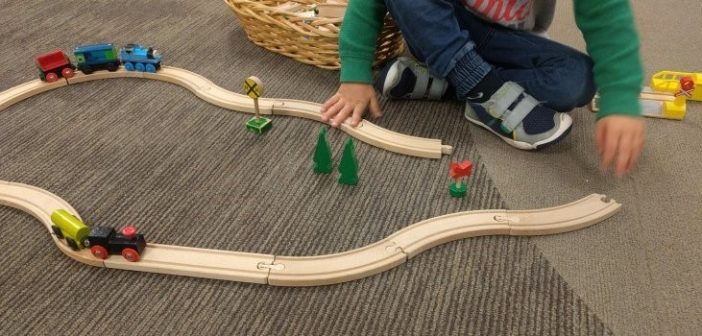You’ve told your four-year-old to get his jacket on because it’s time to go to school. You’ve told him five times. He keeps ignoring you and playing with his toy train. You step into the kitchen to quietly scream. Ok, that feels a little better, but it doesn’t get Henry out the door. So, what can you do instead?
You can meet Henry at his level, in his world, as he experiences it. Preschoolers are very much here-and-now people. Whatever they’re doing is what completely captures their attention. The present is real; the future, much more abstract. Time certainly has no relevance to a preschooler. His school will be there no matter when he gets there, and the demands of a schedule mean nothing to Henry. So, accept that, and then engage Henry in ways that he can relate to.
 Deb Ellsworth and Tina Charney, two long-time preschool teachers, have written a book called Your Amazing Preschooler: How you Can Have the Same Capable, Confident and Cooperative Child at Home that Teachers Have at School. It’s filled with anecdotes, tips and tools that parents can use, based on their experience with hundreds of young children. How do preschool teachers get their children through the many transitions each day, as smoothly as possible? What would they suggest for Henry’s parent?
Deb Ellsworth and Tina Charney, two long-time preschool teachers, have written a book called Your Amazing Preschooler: How you Can Have the Same Capable, Confident and Cooperative Child at Home that Teachers Have at School. It’s filled with anecdotes, tips and tools that parents can use, based on their experience with hundreds of young children. How do preschool teachers get their children through the many transitions each day, as smoothly as possible? What would they suggest for Henry’s parent?
Make it fun and engaging
Deb and Tina blow a wooden train whistle and announce, “All aboard!” when they want the children to line up, and do they come scurrying! One mom who struggled daily to get her child out of the house tried this tip. She was ecstatic at her child’s new-found cooperation. “You saved my life!” she said. (Of course, Henry would especially be drawn to a train whistle, since he loves trains. It helps to play to your child’s interests.)
They would also assure Henry that his train will still be set up and waiting for him when he gets home. They might ask if he’d like to bring along the train engine to hold on the car ride, easing that transition. They might lay his coat on the floor in front of him and sing, to the tune of “Farmer in the Dell”: “There is Henry’s coat! I see Henry’s coat! Can Henry put it on himself? Yes, he really can!”
Preschoolers relate to what they can see, hear and touch
Have you noticed that your child sometimes seems to tune out when you’re speaking to her? That’s partly because words are more abstract than things. The words, “Put your coat on” have less meaning than the actual physical presence of the coat.
Sign Language, being a very visual form of communication, is quite effective with young children. Often, the signs look like the words they’re conveying. So if you can develop simple signs to tell Henry to put on his coat so you can go in the car to school (signs for coat, car and school), when you simply tap Henry on the shoulder and do the signs, his face will light up with delight at knowing the signs and what you’re saying, and he will be ready to move on to the next thing.
Of course, it also helps to give Henry a warning. No one likes to be interrupted in what they’re doing and told they must immediately stop. Teachers use sand timers or electronic visual timers (available at school supply stores) to give their children a five-minute warning.
These tips apply to all the transitions that your child goes through in a day—bath time, dinner time, bedtime, and clean-up time. Deb used a dinner bell to call her own children to the table when they were young. If your child is reluctant to stop playing and take a bath, have a special bath toy invite her to come play with it. “I’ve got the bubbles ready for us!” Showing your child the book you will be reading at bedtime helps to entice her to stop playing and get ready for bed, much more than just saying “We can read a book if you get ready in time.”
You can help your child want to cooperate with transitions, if you meet him where he’s at!
For more helpful tips and tools, check out YourAmazingPreschooler.com





Giving a warning is my favorite idea here. I remember as a kid feeling anxiety if I didn’t get to a “stopping point” in my play when my parents called me to go somewhere else.
Transitions are always difficult, I’m thankful you shared this. I know that it’s going to help so many of us when we have to make a transition easier on younger children.
I think transitions can sometimes be hard at any age, but especially when you’re a child. These sound like some lovely ways to try and make it easier on your child.
This is really good! I forget this with my 5 year old… and his attention goes everywhere. Such good reminders of ways to truly engage with them right where they’re at.
I really like this age-appropriate approach. Young children get a bad rap for being unreasonable, but when you approach situations with their developmental age in mind it is so much easier.
Transitions can definitely be hard at any age. These are great ways to make them easier for little ones. Thanks!
I agree that they can be hard. That book looks like it would be really helpful too. Any age for kids it can be hard for new transitions.
I always believed very much in preparing my children for as much as I could whenever I could. They feel safe knowing what’s coming. I know I do too. 🙂
I definitely agree: you gotta make it fun! Transitions are hard for anyone at any age. Making things come off exciting and hyping it all up can really help with the transition process.